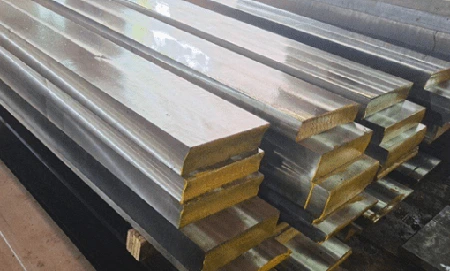Get A Quote
BIS Certification for Quenched And Tempered Alloy Steel Forgings For Pressure Vessels IS 12145: 1987

The product
satisfies the necessary quality and safety requirements in accordance with
Indian legislation thanks to BIS Certification for Quenched and Tempered Alloy
Steel Forgings for Pressure Vessels IS 12145: 1987. Manufacturers that want to
offer these vital components in India, particularly for use in high-pressure
applications, must have this certification.
Thorough testing and manufacturing inspections are part of the procedure. Acquiring BIS Certification for Quenched and Tempered Alloy Steel Forgings for Pressure Vessels IS 12145: 1987 increases the legitimacy of the product, guarantees adherence to regulations, and creates prospects in both local and foreign markets.
The Steel and Steel
Products (Quality Control) Order, 2024, requires the Bureau of Indian Standards
(BIS) to certify quenched and tempered alloy steel forgings for pressure
vessels in accordance with IS 12145:1987. Enhancing product safety, quality,
and performance standards across industrial sectors is the goal of this action.
For these forgings to be produced, sold, or imported into India lawfully,
manufacturers must now adhere to BIS standards. BIS Certification for Quenched
and Tempered Alloy Steel Forgings for Pressure Vessels IS 12145: 1987 increases
market trust and guarantees compliance with regulations.
Why is BIS certification necessary for Quenched And
Tempered Alloy Steel Forgings For Pressure Vessels IS 12145: 1987?
For producers
hoping to meet Indian safety and quality requirements, obtaining BIS
Certification for Quenched and Tempered Alloy Steel Forgings For Pressure
Vessels IS 12145: 1987 is essential. The forgings' compliance with the
fundamental mechanical and chemical characteristics needed for high-pressure
vessel applications is confirmed by this certification. Users are reassured of
the product's dependability, while producers are assisted in achieving legal
compliance, evading market constraints, and enhancing customer confidence. A
quality indicator that promotes both domestic distribution and export
preparedness is BIS certification.
Overview of Indian Standard IS 12145: 1987
Pressure vessel forgings made of quenched and
tempered alloy steel must meet technical specifications outlined in IS
12145:1987. This standard describes the chemical makeup, mechanical
characteristics, heat treatment procedures, and testing techniques that
guarantee performance and safety in high-pressure applications. In sectors like
power plants and petrochemicals, it is essential to preserve the dependability
and integrity of products. BIS Certification for Quenched and Tempered Alloy
Steel Forgings for Pressure Vessels, IS 12145:1987, guarantees that producers
adhere to these safety and quality standards, boosting the legitimacy of the
product and its acceptance by the government.
Process for BIS Certification
The BIS
certification process for Quenched And Tempered
Alloy Steel Forgings For Pressure Vessels IS 12145: 1987, involves multiple
steps designed to thoroughly evaluate a product's compliance with the required
standards. Here is a general overview of the certification process:
1. Application Submission: Manufacturers must submit an application form
along with the required documentation to BIS.
2. Documentation Review: BIS reviews the submitted documents to ensure
completeness and correctness.
3. Factory Inspection: BIS officials conduct an on-site inspection of
the manufacturing facility to assess the production process and quality control
measures.
4. Sample Testing: Product samples are taken and tested in BIS-approved
laboratories to verify compliance with Indian standards.
5. Certification Grant: Upon successful completion of the inspection and testing, BIS grants certification, allowing the manufacturer to use the BIS mark on their products.
Documents Required for BIS Certification
To apply for BIS certification, manufacturers need to submit the following documents:
● Application form
● Manufacturing process details
● Quality control plan
● Test reports from BIS-approved laboratories
● Factory layout and equipment details
● Proof of business registration
● Product specifications and technical details
● Declaration of conformity to Indian standards
Additionally, manufacturers may be required to provide proof of compliance with environmental and safety regulations, depending on the specific type of product being certified.
BIS ISI Mark Certification Costing And Timeline
To Know The Process in Detail, Please Visit:
Under BIS Registration Products ISI and CRS
Conclusion
Finally, to guarantee product safety, quality, and
conformity with Indian requirements, producers must get the BIS Certification
for Quenched and Tempered Alloy Steel Forgings for Pressure Vessels, IS 12145:
1987. This certification increases confidence among stakeholders and end users
in high-pressure applications, in addition to validating the steel forgings'
mechanical qualities and chemical makeup. Our speciality at EVTL India is
offering comprehensive consulting services that help our clients complete the
certification process quickly and easily. We help manufacturers match their
goods with BIS criteria by using our extensive experience and regulatory
knowledge, which speeds up market entrance and reduces compliance risks. Your products
will be able to meet the highest standards of safety and performance in
pressure vessel applications if you work with EVTL India to ensure that your
journey towards BIS Certification for Quenched and Tempered Alloy Steel
Forgings for Pressure Vessels IS 12145: 1987 is managed professionally and
effectively.
Free Call Back
Latest News & Update
📅 BIS Critical Component List (CCL) Updates for Solar PV Modules
🕒 BIS Fee Concessions for MSMEs and Startups | EVTL India
📅 Guidelines for Implementation of Essential Requirements for Security of CCTV
🕒 Omnibus Technical Regulation (OTR) Amendment Order, 2025
🕒 Extension of Timeline for Filing Annual Returns by Battery Producers
📅 Extension of Timeline for Filing Quarterly and Annual Returns for E-Waste
🕒 Extension of Concurrent Running Period for IS 302-1: 2008 and IS 302 (Part 1): 2024
🕒 BIS Guidelines for Grant of Licence (GoL) | EVTL India
📅 CPCB Guidance on filing of Application, Fees and more
🕒 CPCB Notification on Labelling of Plastic Packaging
📅 Mandatory Compliance for Input Materials of Steel and Steel Products for Imports
🕒 BIS Guidelines for Scheme-X Certification for OTR-Regulated Products
📅 BIS Upgrades Product Certification License Numbers to 10-Digit Series
🕒 BIS Certification No Longer Mandatory for 14 Chemical & Polymer Categories
Why Choose EVTL INDIA
Expertise in Indian Regulatory Standards
End-to-End Support
Trusted by Top Indian & Global Brands
Fast Processing & Transparent Pricing
Strong Liaison with Indian Authorities
Company Profile














